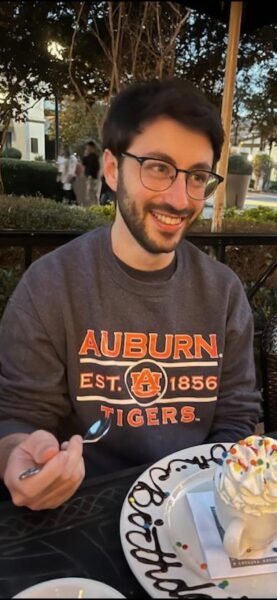You do a wonderful job of setting such an evocative scene. I can vividly see this playing out in my own rural hometown; a small-area star who lifts the town to relevancy. I wonder, is this kind of collective, townwide hope something you’re drawing from personal experience?
I appreciate that. I didn’t grow up in a small town, but my mom did, and I’ve worked in one for the past four years. There’s a sense that everyone in a small town understands each other a little more than they do in big cities—having had so many shared experiences—and I would think that would make it easier to live vicariously through a local star.
Why basketball? (Rather than football, baseball, etc.) Is there any special significance to you there?
First of all, it’s my favorite sport (Go, Lakers!). But also, I chose it because, even though it’s a team sport, it’s also one you can practice on your own. At minimum, you need someone to toss the football or baseball back and forth with, but Larry doesn’t need anyone to help him dribble or shoot, despite what the narrator tells himself. Then there’s the fact that, even more so than football and baseball, basketball is a star-driven sport. Michael Jordan. LeBron. Bird. Magic. Oftentimes, basketball players are more popular than the teams they represent. They become true international icons and pop cultural figures. The sport markets its athletes as larger than life heroes, and I think that fits the dynamic I’m going for in this story.
Your story is exactly one thousand words. You effectively show us so much about the narrator’s life in that time, and so much of that comes from what is not present (e.g., the narrator’s parents). Could you talk about your process of narrowing those details down to fit such a tightly constructed narrative?
There’s an earlier version of the story that’s closer to 1,500 words. Much of what I ended up deleting were details addressing how the narrator felt about living in the trailer park. In the end, those details seemed a lot less important than the ones focused on how he feels about Larry (and about Rex).
There’s this beautifully written and sad juxtaposition set up between Larry and Rex. The narrator idolizes Larry, and there’s the impression this idolization intensifies Rex’s resentment about life. Both characters are hardworking, yet they are perceived so differently by those around them. Could you speak on the idea of the Idealized American Work Ethic and the way our perceptions can be influenced by circumstance?
Wow, great question. And yes, there’s definitely something sad about the fact that the narrator’s prevailing perception of his brother is that he’s “miserable, pale, and tired,” despite the implication that Rex is doing his best to provide for them. There’s a lot of mythos surrounding the work ethic of different athletes but certainly not surrounding someone who works at a convenience store late into the night. I think there’s an idea that an athlete is totally self-driven, while us average folks are just doing what we need to do. Rex is working late because he has to, not because of some force of will. It’s almost as if work ethic only matters if you’re working toward something greater—a better job, a lofty goal, higher pay. I wonder how many other countries have a phrase akin to “dead-end job,” which implies that regardless of how hard you work at that job, you always in some sense feel like a failure. We seem to define someone’s success and work ethic by their career rather than by how hard they work at that career. If you tell a group people to say who they think has better work ethic, the lawyer or the convenience story cashier, they’d probably choose the former because of the perceived difficulty of the path to becoming a lawyer, the salary, etc. They wouldn’t consider the fact that the first person could be a really lazy lawyer and the cashier could routinely go above and beyond to help customers find what they need. So yes, Rex resents the adulation that Larry receives, not because he thinks he deserves it too, but because no matter how hard he works, even if he works much harder than Larry, there’s nothing he’ll ever be able to do that will match the respect the kids have for the athlete trying to make it big.
The title, the fact that Larry is referred to as a “god,” and multiple mentions of Rex’s soul give this story a religious/spiritual undertone. How intentional was this, and did you begin with those themes or find them along the way?
I appreciate that attention to detail. I didn’t start with that idea necessarily, but it became intentional during the editing process. The title is sort of a play on the idea that the narrator’s perception of who his savior is changes over the course of the story. For most of the story, he, like all the other kids in the trailer park, believes that Larry will be the one to save them from their situation, that he’ll somehow take them with him to whatever heights he achieves. But at the end, I wanted to leave the reader with the sense that he’s finally realizing what Rex has gone through for them, at least to an extent, and also that some of the loving brother he fondly remembers is still in there somewhere.


